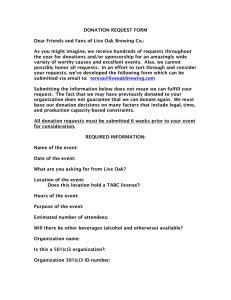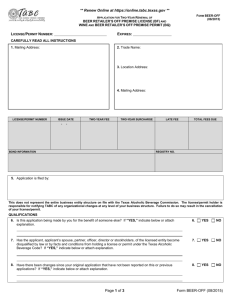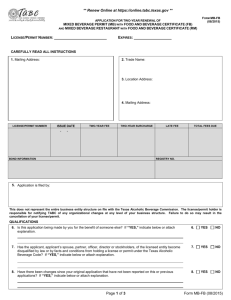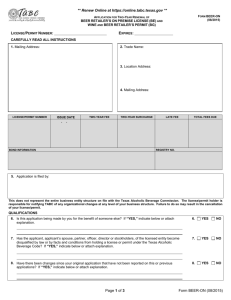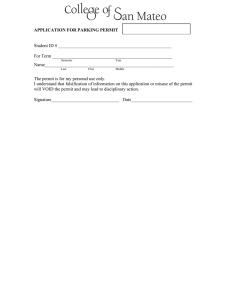Texas Alcoholic Beverage Commission Quarterly
advertisement
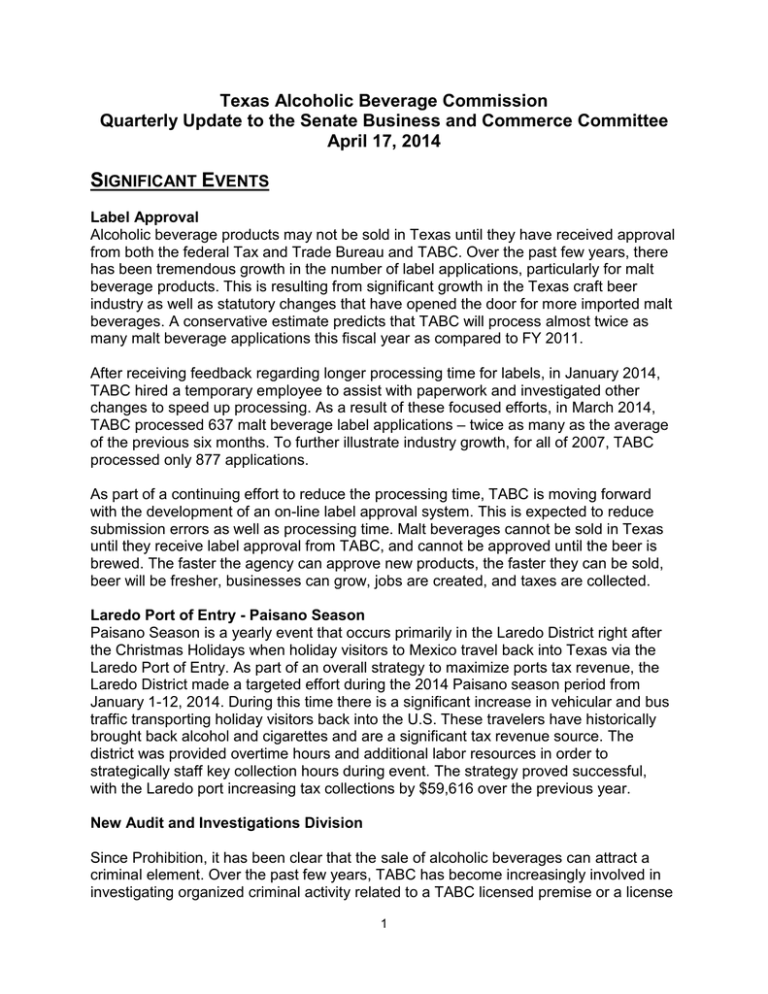
Texas Alcoholic Beverage Commission Quarterly Update to the Senate Business and Commerce Committee April 17, 2014 SIGNIFICANT EVENTS Label Approval Alcoholic beverage products may not be sold in Texas until they have received approval from both the federal Tax and Trade Bureau and TABC. Over the past few years, there has been tremendous growth in the number of label applications, particularly for malt beverage products. This is resulting from significant growth in the Texas craft beer industry as well as statutory changes that have opened the door for more imported malt beverages. A conservative estimate predicts that TABC will process almost twice as many malt beverage applications this fiscal year as compared to FY 2011. After receiving feedback regarding longer processing time for labels, in January 2014, TABC hired a temporary employee to assist with paperwork and investigated other changes to speed up processing. As a result of these focused efforts, in March 2014, TABC processed 637 malt beverage label applications – twice as many as the average of the previous six months. To further illustrate industry growth, for all of 2007, TABC processed only 877 applications. As part of a continuing effort to reduce the processing time, TABC is moving forward with the development of an on-line label approval system. This is expected to reduce submission errors as well as processing time. Malt beverages cannot be sold in Texas until they receive label approval from TABC, and cannot be approved until the beer is brewed. The faster the agency can approve new products, the faster they can be sold, beer will be fresher, businesses can grow, jobs are created, and taxes are collected. Laredo Port of Entry - Paisano Season Paisano Season is a yearly event that occurs primarily in the Laredo District right after the Christmas Holidays when holiday visitors to Mexico travel back into Texas via the Laredo Port of Entry. As part of an overall strategy to maximize ports tax revenue, the Laredo District made a targeted effort during the 2014 Paisano season period from January 1-12, 2014. During this time there is a significant increase in vehicular and bus traffic transporting holiday visitors back into the U.S. These travelers have historically brought back alcohol and cigarettes and are a significant tax revenue source. The district was provided overtime hours and additional labor resources in order to strategically staff key collection hours during event. The strategy proved successful, with the Laredo port increasing tax collections by $59,616 over the previous year. New Audit and Investigations Division Since Prohibition, it has been clear that the sale of alcoholic beverages can attract a criminal element. Over the past few years, TABC has become increasingly involved in investigating organized criminal activity related to a TABC licensed premise or a license 1 holder. For this reason, in 2012, the Legislative Budget Board assigned TABC two new performance measures related to organized crime related to alcoholic beverages: 1. The number of investigations completed by enforcement agents relating to human trafficking, drug trafficking, or other organized criminal activity by a TABC Licensee/Permittee. 2. The number of joint operations involving TABC and at least one other agency and that target organized crime activities that occur on licensed premises in the TABC Border Region or that involve illegal importation of alcoholic beverages from Mexico. In order to support these new performance measures, in 2013, TABC reorganized staff in the Compliance and Enforcement Divisions to create a new Audit and Investigations Division. The division is responsible for asserting the state’s interest in taxation and financial integrity of permit/license holders in the alcoholic beverage industry through intelligence analysis, investigations, and regulatory functions. The division has three functional parts: an Auditing Unit, Financial Crimes Unit and the Special Investigations Unit. It is comprised of Auditors, Certified Peace Officers, and Certified Fraud Examiners. Auditors in the Audit Division conduct investigative audits and other financial reviews, conduct inspections and fee analysis during the initial phases of the licensing process, and assist the agents in various types of investigations. Auditors also play a role in monitoring seller training schools to ensure compliance with agency standards. The Financial Crimes Unit focuses on prevention, investigation and detection of financial related crimes. Investigations include money laundering, prohibited tier relationships, tax fraud, business and corporate fraud, and other organized financial crimes activity committed by persons/entities having a license or permit issued by the Commission. The Special Investigations Unit identifies and investigates habitual patterns of at-risk behavior of persons/entities holding a license or permit issued by the Commission through covert operations. The unit exercises administrative and criminal powers to suppress or dismantle organized criminal activity relating to the functions of the Commission. The unit conducts both administrative and criminal investigations. These employees routinely work in partnership with other local, state, federal law enforcement agencies such as Drug Enforcement Agency, Federal Bureau of Investigations, United States Secret Service, Immigration and Customs Enforcement, Internal Revenue Service, Joint Terrorism Task Force, U.S. Office of Attorney General, U.S. Marshal’s Office, Department of Public Safety, State Comptroller’s Office, Texas Workforce Commission, Texas Attorney General’s Office and a variety of other Police Department and Sheriff’s Offices. Unit members also form partnerships with County Prosecutor’s Offices throughout the State of Texas. 2 IMPLEMENTATION OF BEER-RELATED LEGISLATION TABC has implemented, without significant problems or concerns, all beer-related legislation that went into effect following the 83rd Legislative Session. SB 515 by Eltife authorizes a brewpub to manufacture up to 10,000 barrels a year instead of 5,000. Authorizes brewpubs to sell their own malt beverages to wholesalers and distributors. Authorizes brewpubs holding a BG permit who only sell their own product to sell to retailers (up to 1,000 barrels), and to any qualified person outside of Texas. Effective 6-14-13. Brewpubs who wish to sell their products to distributors must submit a territorial agreement to TABC and receive label approval on the products. At this time, four brewpubs have submitted territorial agreements. Nine brewpubs have obtained label approval for products, indicating that they expect to sell their product to retailers, distributors, or ship to qualified persons outside of Texas. Ten new brewpub licenses have been issued in just the first part of 2014, including three at locations that were already operating as bars/restaurants. Similarly, ten new brewpub licenses were issued in 2013, including two that switched from breweries to brewpubs (Jester King and New Braunfels Brewing Company). In comparison, TABC issued five brewpub licenses in 2012 and nine in 2011. There are now 63 brewpubs in Texas: 38 with Wine and Beer Permits (BGs) and 25 with Mixed Beverage Permits (MBs or RMs). There is one part of SB 515 that may need to be addressed during the 84th legislative session. Section 74.10 of the Alcoholic Beverage Code appears to require a brewpub to sell their ale only to the holder of a Local Class B Wholesaler’s Permit (LX). However, AB Code 20.01(2) appears to allow the holder of a General Class B Wholesaler's Permit (X) to purchase a brewpub’s ale. This is somewhat of a contradiction. TABC is looking at the Code in its entirety in order to achieve a just and reasonable result that reflects the circumstances under which SB 515 was enacted (e.g., to allow off-premise sales of brewpub products). TABC also seeks to avoid unnecessary consequences that would follow from a contrary interpretation (e.g., to require holders of X or W permits to also pay for an LX permit just in order to distribute brewpub products). For these reasons, at this time, TABC will not require the holder of a General Class B Wholesaler's Permit (X) to obtain a Local Class B Wholesaler’s Permit (LX) in order to purchase malt beverages from a brewpub. However, the agency is encouraging the affected members of the industry to seek statutory clarification of the legislative intent during the 84th legislative session. TABC will revisit the issue after September 1, 2015, if necessary. SB 516 and SB 517 by Eltife changed the limits on small brewers and manufacturers selling directly to retailers. Under previous law, a brewer or manufacturer who made less than 75,000 barrels annually could self-distribute any amount. Under SB 516 and SB 517, a brewer or manufacturer who makes less than 125,000 barrels annually can 3 obtain a self-distribution permit or license and sell up to 40,000 barrels to retailers annually. Effective 6-14-13. Although SB 516 and SB 517 went into effect June 14 th, TABC was unable to begin issuing the new permit and license types until a rule was passed establishing a surcharge. In the meantime, those brewers and manufacturers who were already selling direct to retailers were allowed to continue these sales without the new license/permit. The new rule became effective October 24, 2013, and the agency has been accepting applications and issuing the licenses and permits since that time. As of April 14, 2014, 43 breweries (56% of craft breweries) have obtained self-distribution licenses/permits. SB 518 by Eltife authorizes manufacturers and brewers who produce less than 225,000 barrels of malt beverages annually to sell up to 5,000 barrels annually of malt beverages produced on the premises to visitors at the brewery for on-premises consumption. Effective 6-14-13. Brewers and manufacturers who were previously providing free malt beverages to visitors at the brewery are now charging for these drinks. TABC has not been made aware of any problems created by this new authority. However, the agency is in the process of reviewing TABC Administrative Rule 45.103 On-Premise Promotions. Currently, this rule applies to retailers and prohibits happy hour practices and drink specials that can be construed as encouraging excessive consumption. Because all members of the manufacturing level now have the authority to sell direct to consumer, the agency believes the same restrictions should apply to breweries, wineries and distilleries. Nine new breweries have obtained permits so far in 2014. In 2013, 20 new breweries in Texas obtained permits as compared to 18 in 2012 and 19 in 2011. (One brewery permit issued in December 2013 has already been voluntarily canceled.) There are currently 82 total “packaging” breweries in Texas; 77 are craft brewers and five are large breweries. SB 639 by Carona clarifies the prohibition on reach-back pricing and prohibits a manufacturer from accepting payment for a territorial agreement. Nothing in section 102.75 AB Code shall interfere with the rights of a manufacturer or distributor from entering into contractual agreements that could be construed as governing ordinary business transactions. Nothing in the Code prohibits contractual agreements between members of the same tier who hold the same licenses and permits. Effective 6-14-13. Although this new legislation has resulted in many discussions about legislative intent and the precise meaning of language in the bill, there have been no complaints filed and no contractual agreements called into question. 4 HB 3307 by Geren defines alternating brewery proprietorship and contract brewing arrangement and authorizes brewers, nonresident brewers, manufacturers and nonresident manufacturers to engage in these activities, removing the requirement that they have been in business on May 1, 2005. Both brewers involved in the contract must hold a TABC permit at the location where the brewing takes place. A bond is required for an entity involved in these activities that does not own a fee interest in a brewing facility. A brewer, nonresident brewer, manufacturer and nonresident manufacturer shall verify to TABC on an annual basis that a brewing or manufacturing facility owned or controlled by the permit or license holder is not used to produce malt beverages primarily for a specific retailer or the retailer's affiliates. Effective 9-1-13. TABC has issued one permit to a new brewery location in Fort Worth that we believe intends to provide contract brewing services to other entities. There may be others. There are a number of brewery locations outside of Texas that hold TABC permits and will likely participate in contract brewing. Recently, the agency has been approached by two international brewers who wish to begin distributing them in Texas. Unfortunately, in both situations, the breweries contract the brewing of their brands to breweries who don’t sell any product in Texas and have no motivation to obtain a TABC permit. Time will tell whether this becomes a bigger issue with regard to having a number of international beers unable to distribute in Texas. IMPLEMENTATION OF DISTILLERY-RELATED LEGISLATION SB 828 by Van de Putte created a Distiller's Agent's Permit for employees of a distillery so they can represent the distiller, solicit and take orders from wholesalers and conduct free tastings for consumers at package stores. Effective 9-1-13. Although SB 828 went into effect September 1st, TABC was unable to begin issuing the new permit type until a rule was passed establishing a surcharge. The new rule went into effect October 24, 2013, and the agency has issued 39 permits since that date. SB 905 by Van de Putte authorizes a distillery located in a wet area to sell distilled spirits manufactured by the permit holder to the ultimate consumer: for consumption on the licensed premises (up to 3,000 gallons annually) and for consumption off the premises (up to 3,500 gallons annually) o in unbroken packages containing no more than 750 ml o no more than two 750 ml bottles or the equivalent to the same consumer in a 30-day period. 5 Hours of sale are the same as a mixed beverage or package store permit, depending on whether sale is for on- or off-premises consumption. No shipping or delivery or buying for someone else. The bottle must “bear a notice affixed to the bottle that” says the bottle is commemorative, states the month and year the bottle is sold and is signed by an agent/employee of the permit holder. Effective 9-1-13. We have received several questions about how the wet/dry issue of the location plays into the distillery’s ability to sell for on-premise consumption. In short, if a community has legalized on-premise consumption of spirits, distilleries can sell drinks to visitors. If a community has legalized off-premise consumption of spirits, distilleries can sell commemorative bottles to go. We have heard from a handful Texas towns who would like to have one or more micro-distilleries to boost tourism. However, the communities do not wish to legalize the presence of liquor stores in their town, meaning that the distilleries would not be able to sell commemorative bottles. This is making it difficult to attract distilleries to their towns. IMPLEMENTATION OF OTHER LEGISLATION HB 2806 by Geren states that a retail/winery account is not “delinquent” if the payment is received by the wholesaler not later than the fourth business day after the date payment is due under the credit law system. Effective 6-14-13. An issue has arisen regarding how to handle payments received after the fourth business day if they are paid by a check that has insufficient funds. In the past, if a payment had not been made by the due date, it would have to be made by cash or cash equivalent to prevent a bounced check after it was too late to add the entity to the delinquent list. Under the new law, because the payment is not delinquent until four days after the due date, it does not provide the additional time necessary to discover a check has bounced and report the retailer to TABC to be place on the delinquent list. The issue has been left pending until further development. HB 2818 by Sheffield changed the statutes regarding the effect of local option elections. Current law states that if a justice precinct (JP) holds an election, the only way to over-ride that election is to hold a subsequent election within the same boundaries of the JP at the time of the first election, even if the boundaries have changed or the precinct no longer exists. HB 2818 authorizes a new election to be held using the current justice precinct boundaries. HB 2818 also authorizes the issuance of wine and beer retailer (on- and off-premise) permits (BGs), retail dealer’s on-premises licenses (BEs), or late hours licenses (BLs), in an area that has approved the sale of mixed beverages (spirits, wine, and beer for on-premises consumption), and approved the sale of wine and beer for off-premises consumption. 6 Finally, HB 2818 authorizes the issuance of wine and beer retailer (on- and off-premise) permits (BGs), retail dealer’s on-premises licenses (BEs), or late hours licenses (BLs), to restaurants that hold a Food and Beverage Certificate in an area that has approved the sale of mixed beverages in a restaurant that holds a Food and Beverage Certificate and approved the sale of wine and beer for off-premises consumption. Effective 9-1-13. No significant issues have arisen from this legislation. SB 1035 by Carona was intended to streamline the licensing process by 1) having license applicants pay state fees directly to TABC instead of the county tax assessorcollector; 2) eliminating the requirement of hearings before the county judge in noncontested cases (no protests) but increasing the fee from $5 to $25; 3) codifying the practice of TABC giving 5% of the license fee to the county; 4) requiring that notice of application be posted in a newspaper by the applicant instead of the county clerk. Effective 9-1-13. TABC met with city and county clerks, judges and tax assessor collectors training employees on the new license process. TABC began collecting fees from beer license applicants on February 1, 2014. HB 3572 by Rep. Hildebrand Effective January 1, 2014, a new law went into effect regarding mixed beverage gross receipts taxes. HB 3572 reduced the mixed beverage gross receipts tax from 14% to 6.7%. This tax is included in the drink price and paid by the permit holder. The bill also created a new 8.25% “mixed beverage sales tax” which is charged to the consumer on top of the drink price. As patrons have begun seeing this new tax on receipts, they have contacted TABC asking questions. We are responding with a brief explanation and directing them to the Comptroller’s website for a more in-depth explanation. 7
